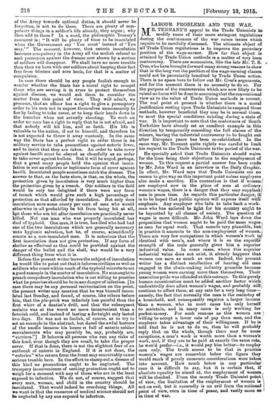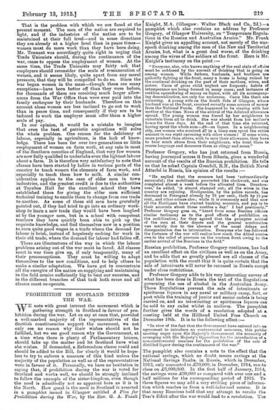LABOUR PROBLEMS AND THE WAR.
MR. TENNANT'S appeal to the Trade Unionists to modify some of their more stringent regulations during the continuance of the war raises issues which require to be carefully discussed. The ultimate object of all Trade Union regulations is to improve the pecuniary position of the wage-earner. How far that object is attained by Trade Union methods is a matter of very keen controversy. There are economists, like the late Mr. T. S. e- Ores, who have brought forward many strong reasons to show that in the long run the position of the wage-earning classes could not be pecuniarily benefited by Trade Union action. There is no space here to follow out Mr. Cree's arguments, and for the moment there is no necessity to do so. For the purpose of the controversies which are now likely to be raised no harm will be done in assuming that the conventional view as to the value of Trade Union methods is correct. The real point at present is whether there is a, moral justification resting upon Trade Unionists to suspend these methods, however beneficial they may he in normal times, to meet the special conditions existing during a state of war. It is important to note that the coalowners of South Yorkshire have already set an excellent example in this direction by temporarily conceding the full claims of the miners, leaving the industrial controversy to be fought out after European peace has been re-established. In the same way, Mr. Tennant quite rightly was careful to limit his request to the Trade Unionists to the period of thewar.
He specially asked that Trade Unionists should waive for the time being their objections to the employment of women. To this request a partial answer has been made by Mr. Sohn Ward in an interview in the Daily Graphic. In effect, Mr. Ward says that Trade Unionists see no reason to give way on this important point unless employers also make a sacrifice. His contention is that if women? are employed now in the place of men at ordinary women's wages, there is a danger that they may supplant) men in peace time. As regards this particular danger, it. is to ho hoped that public opinion will express itself witt- emphasis. Any employer who fails to take back a work- man who has enlisted to light for his country ought to be boycotted by all classes of society. The question of wages is more difficult. Mr. John Ward lays down the proposition that women ought to be paid the same wages' as men for equal work. That sounds very plausible, Mite in practice it amounts to the non-employment of womej There The are very few occupations in which women's work i identical with men's, and where it is so the superior strength of the male generally gives him a superior industrial value. In some eases, where this superior industrial value does not exist, it already happens that women can earn as much as men. Sndeed, the present writer has a distinct recollection of hearing old men engaged in the chain-leaking industry grumble because young women were earning more than themselves. Their masculine pride was offended at this outrage. To this purely human consideration must be added another factor which', undoubtedly does affect women's wages, and probably will!, continue to affect them, at any rate for a very long time— namely, the fact that normally the man is the mainstay of a household, and consequently requires a larger income au a woman, who in most eases has only herself to maintain, and in many cases is only working for pocket-money. For such reasons as this women are I willing to accept a lower rate of pay than men, and the.' employer takes advantage of their willingness. If he is told that he is not to do so, then he will probably reply that on the whole, though there may be some exceptions, a man's work is worth more than a woman's work, and, if they are to be paid at exactly the same rate, he would prefer—i.e., it would pay him better—to employ men only. The truth seems to be that in practice women's wages are somewhat below the figure they would reach if purely economic considerations were taken' into account. How much below in any particulai case it is difficult to say, bat it is certain that, if absolute equality bo aimed at, the employment of women, will be checked. From the merely Trade Unionist point k of view, the limitation of the employment of women is not an evil, but it assuredly is an evil from the national I point of view, even in time of peace, and vastly snore so in time of war.
That is the problem with which wo are faced at the present moment. The men of the nation are required to fight, and if the industries of the nation are to be maintained at their full level—and in some directions they are already at a higher level than in peace times— women must do more work than they have been doing. Mr. Tennant was accordingly quite right in urging that Trade Unionists should, during the continuance of the war, cease to oppose the employment of women. At the same time, the Trade Unionists may fairly ask that employers should reconsider the scale of remuneration of women, and it seems likely, quite apart from any moral pressure, that they will be compelled to do so. Since the war began women in the mass—though there are many exceptions—have been better off than they were before, for thousands of them are receiving much larger allow- ances from the War Office than were ever paid into the family exchequer by their husbands. Therefore on this account alone women are leas inclined to go out to work than in peace time, and consequently if they are to be induced to work the employer must offer them a higher scale of pay.
In our opinion, it would be a mistake to imagine that even the best of patriotic aspirations will solve the whole problem. One reason for the deficiency of labour, especially in agriculture, is the lack of know- ledge. There has been for over two generations so little employment of women on farm work, at any rate in most of the Southern counties of England, that very few women are now fully qualified to undertake even the lightest labour about a farm. It is therefore very satisfactory to note that classes have been started by ladies in various parts of the country to teach women the elements of farm work, and jespecially to teach them how to milk. A similar con- sideration applies to the case of elder men in town industries, and the greatest credit is due to the authorities at Toynhee Hall for the excellent school they have established there for giving the elder men sufficient technical training to enable them to change from one trade to another. As some of these old men have gratefully pointed out, if they had tried to go into an ordinary work- shop to learn a new trade they would have been laughed at by the younger men, but in a school with competent teachers they have quickly been able to pick up the requisite knowledge, and find themselves now in a position to earn quite good wages in a trade where the demand for labour is brisk, instead of hopelessly seeking for work in their old trade, where the demand for labour had fallen off.
These are illustrations of the way in which the labour problems arising out of the war must be faced. All classes must in war time give up, if only temporarily, many of their preconceptions. They must be willing to adapt themselves to the new conditions, and to help others to snake a similar adaptation. We have got to concentrate all the energies of the nation on supplying and maintaining in the field armies sufficiently big to beat our enemies, and in the different branches of that task both sexes and all classes must co-operate.







































 Previous page
Previous page